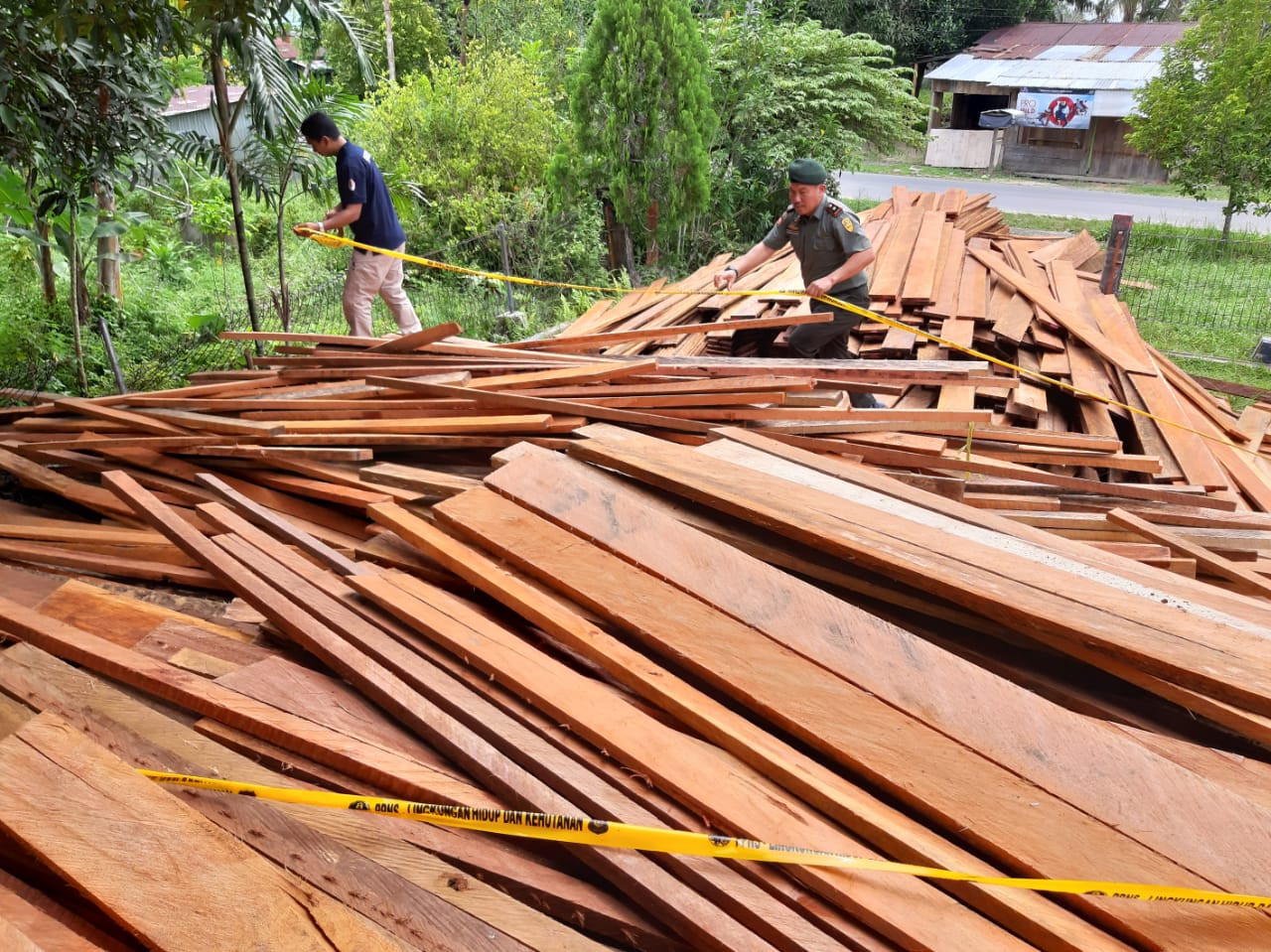Popular Reads
Top Results
Can't find what you're looking for?
View all search resultsPopular Reads
Top Results
Can't find what you're looking for?
View all search resultsFight against illegal logging could be cut back by mobility restrictions: NGO
A recently foiled attempt to smuggle timber out of Gowa, South Sulawesi, is one of a number of cases of illegal logging uncovered since the COVID-19 outbreak began. The Environment and Forestry Ministry investigated at least five other similar cases in April alone and many more over the last three months.
Change text size
Gift Premium Articles
to Anyone
F
orest rangers on patrol in Gowa, South Sulawesi, knew something was amiss when they noticed a man in his mid-50s loading two-meter-long logs onto a yellow truck in a protected forest. The rangers approached him and asked for legal documentation but the man, identified by the initials FT, could not provide any.
The rangers searched the vehicle and found 74 logs of blackboard trees inside the truck in what was allegedly another attempt to smuggle timber in late April. Investigators said they would soon bring FT to court, where, if convicted, he could face a maximum of 10 years behind bars or a fine of Rp 5 billion (US$323,695) for violating the 1999 Forestry Law.
"We will continue to expose an even broader illegal logging network and the masterminds behind it so that we can create a deterrent effect," Environment and Forestry Ministry Sulawesi regional law enforcement head Dodi Kurniawan said.
The case in Gowa was one of numerous instances of illegal logging to be uncovered since COVID-19 began to spread outside of China in mid-January. The ministry investigated at least five other similar cases in April alone and many more over the last three months.
The illegal logging cases recorded during the COVID-19 outbreak might only be the tip of the iceberg, said Syahrul Fitra from the environmental NGO Auriga Nusantara, citing the organization’s past observations in Makassar, South Sulawesi, and Sorong, West Papua.
Read also: Police arrest two on suspicion of illegal logging in Riau
He said large-scale social distancing would likely force the ministry to deploy fewer officers on the field, thereby weakening law enforcement.
He also feared that a recent regulation by the Trade Ministry that relaxed export regulations for timber products would stoke further illegal logging this year. The regulation scrapped the requirement for Indonesian timber companies to secure V-legal documents certifying that the wood came from legal sources before exporting products. This change in policy has made it harder for authorities to monitor timber exports.
In addition, ongoing forest fires in some regions could divert the government’s attention away from monitoring illegal logging, activists have warned.
Read also: Deregulation puts sustainable timber trade at risk
The environment ministry has not disclosed official data on illegal logging during the pandemic or data on how much damage has been done to the environment over the period. However, data from April 23 shows that about 465,500 hectares of land were deforested between 2018 and 2019, lower than the 493,300 ha recorded between 2017 and 2018 but still the smallest decrease since 1990, disregarding previous increases.
The current pandemic, activists have said, should serve as a wake-up call for the government to stop illegal logging. A 2016 United Nations Environment Program report found that the risk of emergent and fast-spreading diseases increased as encroachment upon natural habitats by human activities intensified. The proximity enabled pathogens found in wild areas to spill over into livestock and humans.
“It is important to prevent illegal logging so that we do not have new viruses like what we have right now. If not, we will face what scientists have warned about, which is the emergence of new viruses that we have never seen before,” Syahrul said.
One solution amid current mobility restrictions, he said, was for the Environment and Forestry Ministry to integrate its online system SIPUHH, which compiles information on forest products, with the Industrial Material Fulfillment Plan (RPBBI), which compiles information on the industrial use of timber sourced from natural forests as well as information on non-tax state revenue systems.
With such a combined system, investigators could detect discrepancies between the amount of timber exported or used by industries and the number of trees logged and transported across Indonesia. Authorities, Syahrul said, could then decide to act upon the information and refuse to issue certificates needed to transport the timber if violations were detected.
Environment and Forestry Ministry law enforcement director general Rasio Ridho Sani declined to comment. But last month, he said the ministry would not scale down efforts to enforce forestry laws during the pandemic. He said field officers would continue to patrol forests.
The ministry said it would also use satellite imagery to monitor deforestation and would use videoconferencing platforms to question suspects being held in detention facilities elsewhere.
"We expect judges to punish perpetrators of environmental and forest crimes as severely as possible so that there is a deterrent effect,” Rasio said.










